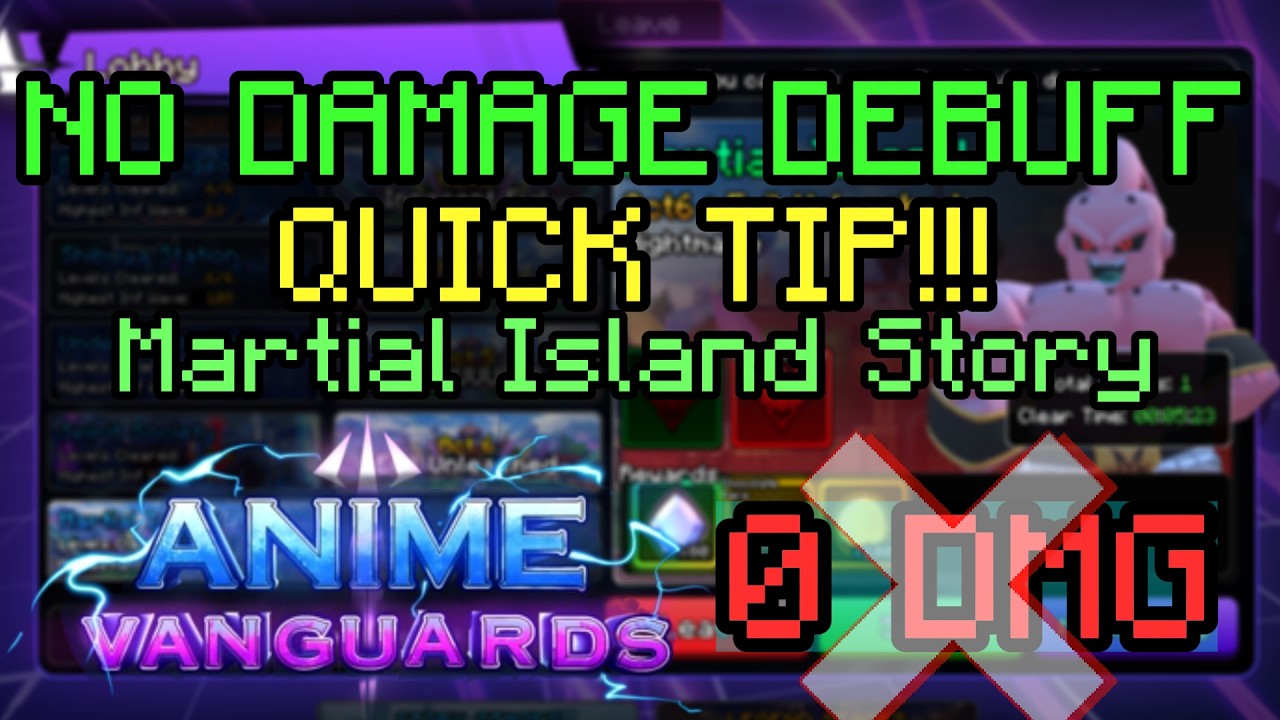Looking for a comprehensive guide to anime vanguards debuffs and how they impact your gameplay? This complete guide covers all debuff types, their effects, sources, and most importantly, how to counter them effectively. Understanding debuffs is crucial for advanced gameplay, especially in challenging content like Legend Stages and Raids.
What Are Debuffs in Anime Vanguards?
Status Effects are modifiers, buff or debuff effects, caused by certain units or enemies. They are applied during every hit of a multi-hit unit’s attack cycle, and generally have cooldowns to limit their potency. Debuffs specifically weaken your units by reducing their effectiveness or dealing damage over time.
Key Debuff Mechanics:
- Applied on every hit of multi-hit attacks
- Have cooldowns to limit their potency
- Can stack or have duration-based effects
- Sourced from enemy units or environmental hazards
- Can be cleansed by specific units or elements
Complete List of Anime Vanguards Debuffs
Damage Over Time (DoT) Debuffs
Burn
- Effect: Deals DoT (Damage over Time) to enemies
- Stacking: Infinitely stacks, meaning you can equip a lot of burn units to achieve massive burn damage
- Special Uses: Useful for Infinite Mode due to stacking nature
- Note: Every DoT type can crit for increased effectiveness
Intense Burn
- Effect: Deals DoT (Damage over Time) based on enhanced burn mechanics
- Difference: More powerful version of regular burn
- Application: Applied by specific high-tier units
- Strategy: Excellent for sustained damage builds
Bleed
- Effect: Deals DoT based on the unit’s damage stat (Does not stack)
- Varies: Damage varies between different units
- Special Property: Nullifies Regen enemies’ ability to regenerate temporarily while the unit is applying bleed
- Important: Does not apply to Revitalize effects
Stat Reduction Debuffs
Based on elemental immunities, we can identify these debuff categories:
Damage Reducing Debuffs
- Effect: Reduces unit damage output
- Counter: Spark element grants immunity to damage reducing debuffs
- Impact: Severely hampers DPS units
- Sources: Enemy abilities and environmental effects
Range Reducing Debuffs
- Effect: Decreases unit attack range
- Counter: Nature element grants immunity to range reducing debuffs
- Impact: Forces units closer to enemies, increasing vulnerability
- Strategy: Particularly dangerous for long-range units
SPA Reducing Debuffs
- Effect: Reduces Skills Per Attack (attack speed)
- Counter: Water element grants immunity to SPA reducing debuffs
- Impact: Dramatically reduces unit effectiveness
- Concern: Critical for units dependent on high attack frequency
Control and Utility Debuffs
Freeze
- Effect: Freezes enemies in place, preventing movement and attacks
- Source: Units like Julias (Eisplosion) apply freeze effects
- Duration: Varies by unit and upgrade level
- Strategy: Excellent crowd control for managing enemy waves
Stun
- Effect: Prevents enemy actions temporarily
- Application: Applied by specific units during certain conditions
- Tactical Use: Creates windows for repositioning or ability usage
- Counter: Can be cleansed by cleanser units
Slow
- Effect: Reduces enemy movement speed
- Stacking: May stack with other movement-impairing effects
- Common Source: Many units apply slow as secondary effect
- Utility: Extends engagement time for more damage
Tethered
- Effect: Tethered enemies share 0.1% of the damage any of them take and are slowed by 20%
- Breaking Condition: Breaks if they leave this unit’s range
- Strategic Value: Creates damage multiplication against grouped enemies
- Positioning: Requires careful unit placement to maintain effect
Scorched
- Effect: Scorched enemies take 20% more damage from Fire allies
- Elemental Synergy: Works specifically with Fire element units
- Team Building: Encourages Fire-focused team compositions
- Multiplier: Stacks with other damage amplification effects
Special Debuff Effects
Bubbled
- Effect: Bubbled enemies take 30% increased damage from 1 attack
- Source: Applied by units that spawn bubbles dealing damage
- Tactical Use: Excellent for burst damage strategies
- Timing: Requires coordination to maximize the damage bonus
Rupture
- Effect: Applied by specialized units like Super Vogito
- Interaction: Ignores enemy dodge chance when applied
- Advanced Mechanic: Part of complex unit ability systems
- Strategic Value: Ensures reliable damage against evasive enemies
Elemental Immunities and Debuff Counters
Natural Immunity System
Grants units Immunity to specific debuff types through elemental advantages:
Spark Element
- Immunity: DAMAGE reducing debuffs
- Best For: Protecting your primary DPS units
- Strategy: Essential for damage dealers in debuff-heavy content
- Team Building: Prioritize Spark element for core attackers
Nature Element
- Immunity: RANGE reducing debuffs
- Best For: Long-range attackers and support units
- Strategy: Maintains optimal positioning advantages
- Content Use: Critical for Legend Stages with range debuffs
Water Element
- Immunity: SPA reducing debuffs
- Best For: Multi-hit and rapid-attack units
- Strategy: Preserves attack frequency advantages
- Synergy: Excellent for DoT-applying units
Fire Element
- Bonus: Grants 1% additional damage per unit placement to other FIRE units in range
- Team Strategy: Encourages Fire element stacking
- Debuff Resistance: While not immunity-focused, Fire units often have burn resistance
- Meta Consideration: Strong in Fire-heavy team compositions
Holy Element
- Effect: Reduces time on Status Effects
- Utility: Shortens debuff duration when applied to your units
- Defensive Value: Helps recover from debuffs faster
- Support Role: Excellent for sustained battles
Cosmic Element
- Special Property: Any Cosmic element unit has self-cleanse
- Autonomy: Can remove debuffs without external support
- Reliability: Ensures consistent performance in debuff environments
- Premium Value: Makes Cosmic units highly valuable
Active Debuff Cleansing Methods
Cleanser Units
Cleansers are units with the ability to cleanse themselves or others from debuffs, removing the negative effects applied to the unit. Cleansers tend to have cooldowns on their cleansing, which can be bypassed by selling and replacing the unit.
Cleanser Categories:
Status Effect and Debuff Cleansers
- Function: Can cleanse stuns and debuffs such as Energy drain
- Scope: Remove various negative effects from allies
- Cooldown: Most cleansers have cooldown limitations
- Bypass Method: Selling and replacing unit resets cooldown
Heaven Ability Cleansers
- Example: Heaven ability cleanses all allies in range of debuffs and status effects (local 10s cd)
- Area Effect: Cleanses multiple units simultaneously
- Range-Based: Affects units within specific radius
- Cooldown Management: 10-second local cooldown typical
Advanced Cleansing Strategies
Timing Optimization
- Use cleansers right before major enemy debuff waves
- Coordinate cleansing with high-damage phases
- Save cleanser abilities for critical moments
- Plan around cleanser cooldowns in extended battles
Positioning Tactics
- Place area cleansers centrally for maximum coverage
- Protect cleanser units from direct enemy focus
- Use terrain advantages for cleanser positioning
- Maintain cleanser unit survival as top priority
Resource Management
- Balance cleanser investment with offensive capabilities
- Use sell-and-replace tactic when cooldowns are prohibitive
- Plan team compositions around cleanser availability
- Consider multiple cleanser sources for reliability
Team Building Around Debuff Management
Debuff-Resistant Core Strategy
Primary Components:
- Spark DPS: Immune to damage reduction, maintains offensive power
- Nature Support: Immune to range reduction, preserves utility positioning
- Water Multi-Hit: Immune to SPA reduction, ensures consistent application
- Cosmic Utility: Self-cleansing capability for autonomous operation
- Active Cleanser: Covers team-wide debuff removal needs
Content-Specific Adaptations
Legend Stages
- Prioritize immunity elements based on stage modifiers
- Include multiple cleansing sources for reliability
- Focus on debuff prevention over reactive cleansing
- Plan team composition around known debuff patterns
Raid Content
- Research boss-specific debuff abilities
- Prepare counter-elements for predictable debuffs
- Include emergency cleansing for unexpected situations
- Balance offensive power with debuff resistance
Infinite Mode
- Emphasize stacking immunity elements
- Plan for escalating debuff intensity
- Use Cosmic elements for long-term sustainability
- Prioritize units with built-in debuff resistance
Advanced Debuff Mechanics
Stacking and Duration Systems
Stackable Debuffs
- Burn effects stack infinitely for massive damage potential
- Multiple slow effects can compound for near-immobilization
- Damage reduction debuffs may stack multiplicatively
- Plan team builds around stackable debuff advantages
Duration-Based Effects
- Holy element reduces status effect duration
- Some debuffs have fixed durations regardless of source
- Cleansing resets duration timers completely
- Environmental debuffs may have different duration rules
Interaction Priorities
Debuff Application Order
- Multi-hit attacks apply debuffs on each hit
- Status effects process before damage calculations
- Immunity checks occur before debuff application
- Cleansing effects process at ability activation
Counter-Interaction Systems
- Immunity completely prevents debuff application
- Cleansing removes existing debuffs but doesn’t prevent reapplication
- Self-cleansing occurs automatically based on unit mechanics
- Manual cleansing requires active ability usage
Meta Implications of Debuff Systems
Current Meta Considerations
Debuff Immunity Premium
- Spark, Nature, and Water immunities highly valued
- Cosmic self-cleanse creates autonomous unit value
- Teams without debuff management struggle in advanced content
- Investment in immunity elements shows strong ROI
Cleanser Unit Value
- Active cleansers essential for competitive team building
- Heaven-type abilities provide superior area coverage
- Cleanser positioning becomes critical tactical element
- Sell-and-replace strategies require economic planning
Future-Proofing Strategies
Balanced Approach
- Don’t over-invest in single immunity type
- Maintain flexibility for unknown future debuff types
- Build around multiple debuff counter methods
- Adapt team compositions based on content updates
Long-Term Planning
- Collect units with diverse immunity properties
- Invest in Cosmic elements for universal debuff resistance
- Develop cleanser unit collection for various scenarios
- Stay informed about debuff mechanic updates
Conclusion: Mastering Debuff Management
Understanding anime vanguards debuffs and their counter-systems is essential for advanced gameplay success. The complex interaction between debuff types, elemental immunities, and cleansing mechanics creates strategic depth that separates casual players from experts.
Key Takeaways:
- Immunity Elements: Spark (damage), Nature (range), Water (SPA) provide targeted protection
- Universal Solutions: Cosmic elements offer self-cleansing capabilities
- Active Management: Cleanser units provide team-wide debuff removal
- Strategic Planning: Team composition must account for expected debuff challenges
- Content Adaptation: Different game modes require specific debuff management approaches
- Meta Understanding: Debuff resistance significantly impacts unit tier rankings
- Resource Efficiency: Balance debuff management investment with offensive capabilities
Action Plan:
- Assess Current Team: Identify debuff vulnerabilities in your main composition
- Prioritize Immunity: Focus on Spark, Nature, and Water elements for core units
- Include Cleansers: Add active debuff removal capabilities to your roster
- Test Resistance: Practice debuff management in challenging content
- Stay Adaptive: Monitor meta changes and adjust strategies accordingly
- Build Depth: Develop multiple team compositions for different debuff scenarios
Whether you’re tackling Legend Stages, pushing through Infinite Mode, or competing in high-level raids, mastering debuff management will dramatically improve your success rate. The investment in understanding and countering debuffs pays dividends through improved unit survival, maintained damage output, and overall team reliability.



